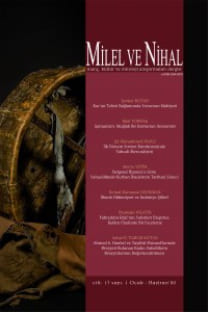Mutfakta Pişir Mutfakta Ye: Çağdaş Dinler Tarihi Metodolojisinde Feminist Yaklaşım
Cinsiyet, Feminizm, Feminist Yaklaşım, Dinler Tarihi Metodolojisi.
Cook in the Kitchen and Eat in the Kitchen too: The Feminist Approach in the Contemporary Methodology of the History of Religions
___
- Adkins, Lisa, Diana Leonard, ìReconstructing French Feminism: Commodification, Materialism and Sexî, Sex in Question, ed. Diana Leonard- Lisa Adkins, London 1996, 1-23.
- After Patriarchy: Feminist Transformations of the World Religions, ed. Paula M. Cooley, Wiliam R. Eakin, New York 1997.
- Alıcı, Mustafa, ìDinler Tarihiínde «ağdaş Metodolojik Problemlerî, Dinler Tarihinde Metodoloji Problemleri Tartışmalı İlmÓ İhtisas Toplantısı (İstanbul 25-26 Haziran 2004), (Basılmamış Tebliğ Metni), 1-44.
- _______, Uluslararası Dinler Tarihi Cemiyeti (IAHR)ínin Dinler Tarihi Metodolojisine Kurumsal Katkısı, Milel ve Nihal, 2 (1), 35-74.
- Boyarin, Daniel, ìGenderî, Critical Terms for Religious Studies, ed. Mark C. Taylor, Chicago- London 1998, 117-135.
- Carol, P. Christ, ìMircea Eliade and the Feminist Paradigm Shiftî, Journal of Feminist Studies in Religion, 1991(5/1), 75-94.
- Carr, Anne E., ìThe Scholarship of Gender: Womenís Studies and Religious Studiesî, Transforming Grace: Christian Tradition and Womenís Experience, San Francisco 1990, 63-94.
- Conn, H. M., ìFeminist Theologyî, New Dictionary of Theology, ed. Sinclair B. Ferguson,- David F. Wright, Leicester ñ Illinois 1996, 255-258.
- Constance H. Buchanan, ìWomenís Studiesî, Encyclopedia of Religion, ed Mircea Eliade, New York-London 1987, Vol. XV, 433-440.
- Edith, Franke, ʺFeministische Kritik an Wissenschaft und Religion.ʺ Kritik an Religionen. Religionswissenschaft und der kritische Umgang mit Religionen, ed. Gritt Maria Klinkhammer- Steffen Rink - Tobias Frick, Marburg 1997, 107-119.
- Delphy, Christine, ìRethinking Sex and Gender, Feminism in the Study of Religion, ed. Darlane M. Jushka, London - New York 2001, 11-23. Gender and Religion. On the Complexity of Symbols, ed. Caroline Walker Bynum, Paula Richman, Boston 1986.
- Gross, Rita M., Feminism and Religion: An Introduction, New York 1996.
- _______, ìMethodological Remarks on the Study of Women in Religion: Review, Critism and Redefinitionî, Women and Religion, ed. J. Plaskow- J. A. Romero, Missoula 1975, 153-165.
- _______, ìStudying Women And Religion: Conclusions Twenty-Five Years Laterî Todayís Woman in World Religions, ed. Arwin Sharma, Albany 1987, 327-361.
- _______, "Tribal Religions: Aboriginal Australia", Women in World Religions, ed. Arvind Sharma, Albany 1994, 39-44.
- Hampson, Daphne, Theology and Feminism, Oxford 1990.
- Hartmann, Heidi, ìThe Unhappy Marriage of Marxism and Feminism: Toward a More Progressive Union,î ed. Lydia Sargent, Women and Revolution: The Unhappy Marriage of Marxism and Feminism, Boston 1981, 210-230
- Maynard, Mary: ìBeyond the ʹBig Threeʹ: The Development of Feminist Theory into the 1990sî, Feminism in the Study of Religion, ed. Darlene M. Jushka, London -New York 2001, 292-313.
- _______, ìRace, ìGenderî, and the Concept of ʺDifferenceʺ inFeminist Thoughtʺ, Feminism in the Study of Religion, ed. Darlene M. Jushka, London -New York 2001, 434 ñ 451
- Moore, Henrietta, Feminism and Anthropology, Cambridge 1988. Penolope Margaret Magee, ì Disputing the Sacred: Some Theoretical Approaches to Gender and Religionî, Religion and Gender, ed. Ursula King, Oxford 1995, 101-120.
- Religious Imagination and the Body- A Feminist Analysis, ed. Paula M.Cooley, New York 1999.
- Ruether, Rosamary Redford,ìFeminist Theologyî, A New Dictionary of Christian Theology, ed. Alan Richardson- John Bowden, Kent 1996, 210-212.
- OíConnor, June,ìThe Epistemonological Significance of Feminist Research in Religionî, Religion and Gender, ed. Ursula King, Oxford 1995, 45-63.
- _______, ìRereading, Reconceiving, and Reconstructing Traditions: Feminist Research in Religionî, Womenís Studies, 17 (1986), 101-123.
- Serenity Young, Sacred Writings by and about Women- A Universal Anthology, London 1993.
- Spender, Dale, ìThe Gatekeepers: a Feminist Critique of Academic Publishingî, Doing Feminist Research, ed. H. Roberts, London 1981, 186-202
- Ursula King, ìA Question of Identity: Women Scholars and the Study of Religionî, Religion and Gender, ed. Ursula King, Oxford 1995,
- _______, ìIntroduction: Gender and the Study of Religionî, Religion and Gender, ed. Ursula King, Oxford 1995, 1-38.
- _______, ìIs there a Future for Religious Studies as We know it? Some Postmodern, Feminist, and Spiritual Challengesî, Journal of the American Academy of Religion, ( June 2002), vol. 70, No. 2, 365-388.
- _______, ʺReligion and Genderî, Turning Points in Religious Studies. Essays in Honour of Geoffrey Parrinder, ed. Ursula King, Edinburgh 1990, 275-286.
- Warne, Randi R., ìGenderî, Guide to The Study of Religion, ed. Willi Braun, Russell T. McCutcheon, London- New York 2000, 140-154.
- White Erin, ì Religion and the Hermeneutics of Gender: An Examination of the Work of Paul Ricaoeurî, Religion and Gender, ed. Ursula King, Oxford 1995, 77-99.
- Wittig, Monique, The Straight Mind and Other Essays, London 1992.
- Women in the Worldís Religions, Past and Present, ed. Ursula King, New York 1987.
- Young, Katherine K., ìHaving Your Cake and Eating It Too: Feminism and Religionî, Journal of the American Academy of Religion, sy. 67/1 (March 1999), 167-184.
- _______, ìIntroductionî, Todayís Woman in World Religions, ed. Arwin Sharma, 1-37.
- ISSN: 1304-5482
- Yayın Aralığı: Yılda 2 Sayı
- Başlangıç: 2003
- Yayıncı: Milel ve Nihal: Eğitim, Kültür ve Düşünce Platformu Derneği
Osmanlı Devleti’nde Gayrimüslimlerin İdari Yapısı: Ermeniler Örneği
Mutfakta Pişir Mutfakta Ye: Çağdaş Dinler Tarihi Metodolojisinde Feminist Yaklaşım
The Study of Hinduism & The Fundamentals of Extremism: The Christian Right in America
Batıda Dinî Metinlerin Eleştirel Tefsiri ve Kur'an Çalışmalarına Yansıması
Hz. Peygamber’in Tevrat’ta Müjdelenmesi Ahmed Midhat Efendi
The Study of Hinduism & The Fundamentals of Extremism: The Christian Right in America
Gerçek ile Kurgu Arasında “Öteki”
